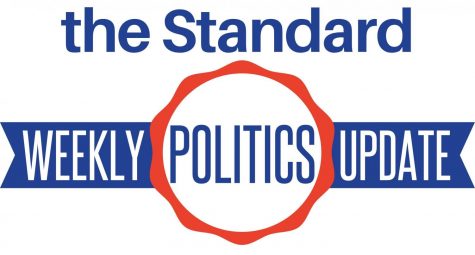Who will stand up to Putin?
Russian President Vladimir Putin has never been known for his subtlety. His various attempts to silence critics both at home and abroad have been quickly exposed by intelligence services.
Most recently, the attempted poisoning of Putin’s most prominent critic, Alexi Navalny, was yet another demonstration of the Russian President’s inability to conduct covert intelligence operations and a complete disregard of the inevitable geopolitical blowback.
Earlier this year, Putin rewrote the Russian constitution in a way that allows him to maintain power for the foreseeable future. Once again letting subtlety go by the wayside, the west immediately realized that this was the move of a dictator trying to cement his position.
With the U.S. seemingly unwilling to stand up to their former Cold War rival, the burden now falls on France and Germany to fill the void.
These attacks against democracy don’t happen exclusively within Russia’s own borders; Putin’s links with the violent suppression of anti-dictatorship demonstrations in Belarus against authoritarian President Andrey Lukashenko are another driving force behind this wave of Putin criticism.
However, such criticism, or lack thereof, of Putin’s actions has been increasingly notable. With the U.S. seemingly unwilling to stand up to their former Cold War rival, the burden now falls on France and Germany to fill the void. Both nations’ respective constituencies among others in Europe have pushed their leaders to call out the Russian President.
Worldwide, many have urged German Chancellor Angela Merkel to take on this burden. Germany is where Navalny was treated and confirmed to have been poisoned with the military-grade Russian nerve agent Novichok. Hence, Merkel demanded that the Russian government investigate the Navalny poisoning. In addition, Merkel may also use Germany’s power with the European Union to sanction Russia, a move she followed through on in 2014 as a reaction to the Russian annexation of Crimea.
The history of Merkel and Putin’s relationship extends back to when they both took office in the early 2000s. The two acted familiarly for quite some time until 2014, when Merkel began opposing Putin. Now, she’s really putting her foot down.
For now, one action is set in the eyes of Germans; the Nord Stream 2 pipeline – an oil pipeline nearing completion that would allow Russian oil to make its way to Germany two times more efficiently than it does now.
Merkel is now seriously considering cutting off the infrastructure project that represents Russian power and oil profits. This is exactly what NATO and Europe needs to keep Putin in check.
Contrastingly, French President Emmanuel Macron’s response has been lackluster, along with many other NATO members.
Recent power-grabbing by the Kremlin is a product of the United States’ leadership vacuum, in which the Trump administration has failed to stand up to Russian aggression. Until he does, Putin’s bully-like intimidation of Europe will persist unchallenged.
Middle Eastern peace materializes
For decades, peace between Israel and the Middle Eastern nations that surround it has seemed improbable, maybe even impossible.
Egypt was the first nation to establish diplomatic relations with Israel in 1979, followed by Jordan in 1994, but no other countries have followed suit in the 26 years since, until this past month.
In quick succession, both the United Arab Emirates and The Kingdom of Bahrain diplomatically recognized Israel as a nation-state.
Fundamentally, the UAE only completed this deal in exchange for Israeli Prime Minister Benjamin Netanyahu’s promise to suspend Israel’s annexation of Palestinean land.
Furthermore, the UAE and Bahrain are both motivated to ally against growing Iranian influence.
It’s important to underline that recognition is not a secondary benefit, rather it means a great deal for a nation whose very existence in the region has been questioned for decades.
On the other side, what does Israel gain from the exchange? For one, credit with the White House. But it’s important to underline that recognition is not a secondary benefit, rather it means a great deal for a nation whose very existence in the region has been questioned for decades.
Israel has also been afforded the luxury of bargaining with other Middle Eastern nations to do the same, using this establishment of peace to trigger a domino effect for more.
The cause of these moves has been brewing for some time. It signifies that the bond of hardline opponents to Israel in the Middle East formed after the six-day war is fracturing. That being said, there remain visceral enemies of Israel, like Iran, who are in no place to extend a hand to Israel to broker a deal, especially not if President Trump is at the table.
The established peace is objectively a success for the Middle East, and potentially boosting Trump’s standing domestically. However, U.S. voters are distracted by topical issues within their own borders, and they simply have limited attention to budget towards foreign policy.
Yet, this is exactly the type of accomplishment Trump can brandish in the coming debates. The question remains whether the infamously poor debater Joe Biden will have the wherewithal to successfully rebut this point.
Trump’s climate kerfuffle
President Trump has long been a climate skeptic, both rhetorically and legislatively. He has repeatedly dismissed the issue as a hoax and cast doubt on the threat it poses. Unfortunately, his policies have largely remained consistent with his statements.
In 2017, he announced that the U.S. was withdrawing from the Paris Climate Accords, signed by the Obama administration just two years prior. The deal, in which all but just the U.S. has signed onto, established a global framework for how countries should mitigate and combat the effects of climate change.
On the domestic front, the Trump administration rolled back the Clean Power Plan, a policy that closed coal-burning power plants and incentivized car manufacturers to produce more fuel-efficient vehicles through tighter regulation.
Additionally, he has threatened to cut federal funding to California in response to wildfires and blamed the state government for not properly raking forest ground. It’s unclear whether he can legally halt that money. However, the symbolism of abandoning the state most at risk from climate change couldn’t be starker.
Yet again this past week, Trump’s doubt of climate change was on full display.
In response to an unprecedented fire season on the West Coast, in which more than 2 million acres of land have burned in California alone, the President announced plans to visit the state.
In a televised press conference with state officials, he was corrected and repeatedly contradicted by the scientific advisors who were attempting to brief him on the situation, falsely claiming that the weather would soon be much cooler.
His position on the issue runs in direct opposition to that of his general election opponent, Former Vice President Joe Biden. A former member of the Obama administration, Biden helped in the passage of both the Paris agreement and Clean Power Plan.
Now as a candidate, he has emphasized the importance of climate change and has laid out a $2 trillion plan to address the issue, which includes the construction of new renewable energy plants and offers incentives for private industry to become carbon neutral.
However, Trump’s climate skepticism may not be an electoral risk. Though its importance has increased in recent years, polling data still indicates that U.S. citizens don’t view climate change as a key political issue.
Only 42% of the electorate see the issue as most important to them. Regardless of its political popularity though, the risks of climate change should outweigh the risk of political blowback in how the candidates conduct themselves.
According to the UN, the world has until 2030 before the effects of climate change become irreversible. The U.S. should make every effort possible over the next decade to limit the repercussions of climate change.










